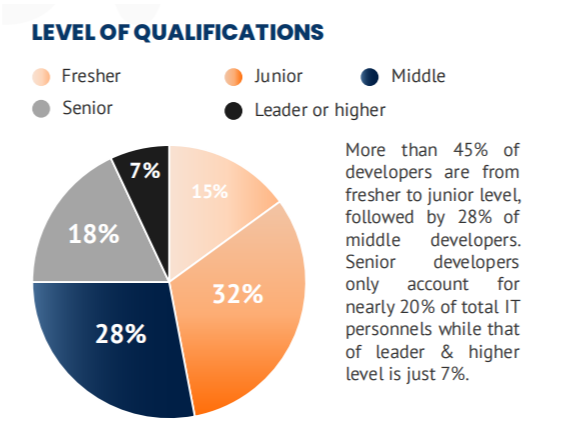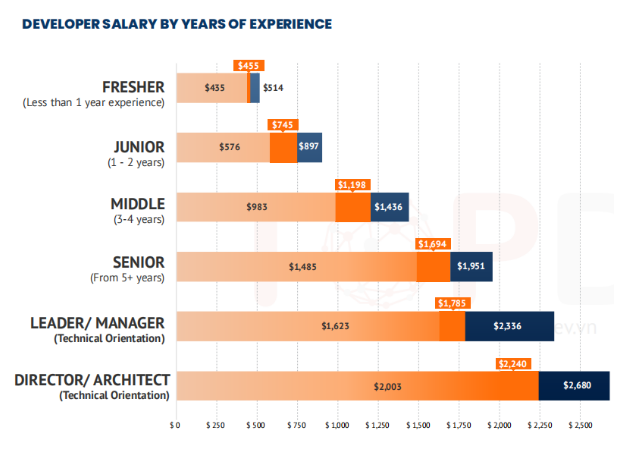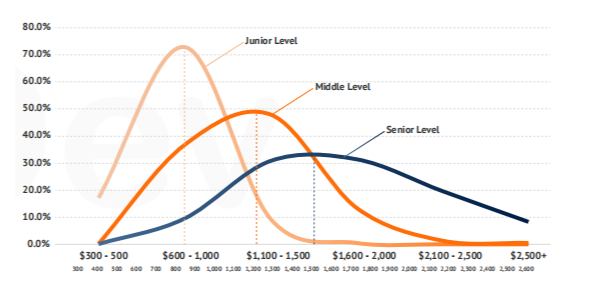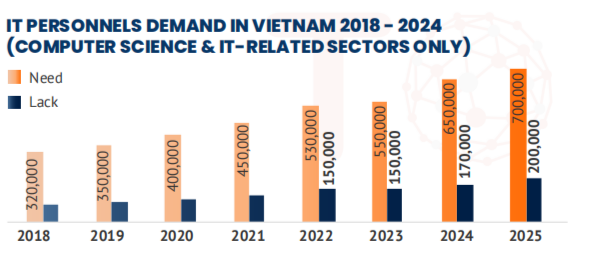Vietnam IT industry has rapidly evolved, becoming a dynamic force that shapes global digital landscapes. Behind this transformative journey lies a crucial element: its human resources. In this blog, VTI will delve into the intricacies of Vietnam’s IT talent pool, shedding light on the driving forces, challenges, and predictions for 2024.
1. Overview of Human Resources of Vietnam IT Industry in 2023
The current workforce of Vietnam IT industry stands at only about 530,000 developers, and most of them belong to Gen Z (1997 – 2012) and Millennials generation (1981 – 1996). These generations desire a better balance, a healthy lifestyle, more information about the company, products, services, and want to be highly involved in the business process with an impacted contribution to their value, their company, and society.

Vietnamese IT professionals have expertise in various domains and are adept at using a wide range of programming languages, frameworks, and technologies.:
- Software development: They have expertise in programming languages such as Java, C++, Python, and JavaScript, and frameworks like Spring, Django, and Angular Web and Mobile App Development.
- Mobile app development: They’ve worked with well-known frameworks and technologies like React, React Native, Flutter, and NodeJs. Vietnamese developers are capable of developing scalable and responsive online applications, as well as native or cross-platform mobile apps.
- Data analysis and data science: They are knowledgeable in technologies and languages like Python, R, SQL, and Hadoop. They can work with large datasets, clean and transform data, and extract information using statistical analysis and machine learning methods.
- Cybersecurity: They know security protocols, encryption algorithms, and vulnerability assessment techniques. They can help organizations identify and mitigate potential security risks and ensure the integrity of their IT systems.
- Artificial intelligence and machine learning: Vietnamese professionals are active in frameworks such as TensorFlow and PyTorch, and can create AI-powered apps, deploy ML models, and execute jobs such as natural language processing, computer vision, and predictive analytics.
- Cloud computing and DevOps: They are familiar with cloud computing platforms like AWS, Azure, Google Cloud, and deploying applications on the cloud, managing infrastructure as code, and implementing DevOps practices for efficient and automated software development processes.
The number of Vietnam IT industry majors at universities is expanding and the number of bachelors graduating in this major is still increasing yearly. The country has more than 300 universities and educational centers specializing in IT, typical of which are Hanoi University of Science and Technology (HUST), Vietnam National University of Science, and FPT University, etc. Annually, these universities collectively produce an impressive figure of around 57,000 graduates in IT-related fields.
To strengthen high-quality IT human resources to meet the requirements of digital transformation in Vietnam, the Prime Minister issued an approving Proposal Project “Raising awareness, universalizing skills and developing national digital transformation human resources by 2025, with a vision to 2030”. Accordingly, it is necessary to encourage and support forms of cooperation between universities, research institutes, domestic and foreign organizations, and businesses to improve the quality of human resource training and build coordination programs with companies to support students in internships and practical work at organizations, businesses, and research institutes.
With all the above-mentioned figures, it is clear that Vietnam is the ideal outsourcing destination for businesses. The booming IT industry, coupled with an abundant pool of high-quality workforce, is creating a favorable environment for collaboration and outsourcing software and IT projects to Vietnam. Moreover, international partners have also begun to recognize the excellence of IT service providers in Vietnam. The collaborative agreements between leading technology companies and universities here are bringing significant benefits to both parties, from training new talents for the IT industry to developing advanced technological solutions.
2. Salary of the Vietnam IT Industry

The salary ranges generally increase as one moves up the job hierarchy, indicating that experience and seniority are rewarded with higher compensation. There are significant differences in salaries among job levels. Leader/Manager and Director/Architect levels have the highest salary ranges, reflecting the increased responsibilities and expertise required for these positions. Freshers can expect to get a salary from $435 to $514, after 2 years, the speed of salary increase seems to be faster as developers have obtained some base knowledge and working experience.

A similar pattern to salary by years of experience is reflected in that of main levels. Generally, the salary will become higher as one climbs up the ladder of working level. More than 70% of juniors are offered around the range of $600 – $1,000. The major range for the Middle level is $1,100 – $1,500 with nearly 50% popularity. Senior level covers a wider salary range mostly starting from $1,100 up to $2,000. Around 10% of Senior positions offer a salary of $2,500 or more.
Fundamental technology groups such as Java, Python, .Net, C++, and PHP have been considered consistently high-paying over the years. New high-tech skills related to cloud/AI/ML/DevOps are seeing greater investment in higher salaries with the huge impact of today’s real-world cloud computing applications, Generative – AI, and modern software development process.
3. Emerging Trend Jobs in Vietnam IT Industry
The rise of specific specializations within the Vietnam IT industry (e.g., cybersecurity, AI, blockchain).
- Artificial Intelligence and Machine Learning: Machine Learning the subset of AI, is also being deployed in all kinds of industries, creating a huge demand for skilled professionals. Mastering AI and machine learning will help you secure jobs like AI research scientist, AI engineer, AI architect, and machine learning engineer.
- Cybersecurity: With the increasing frequency and sophistication of cyber threats, cybersecurity has become a top priority for organizations. Cybersecurity analysts, ethical hackers, and information security managers are among the most sought-after IT professionals.
- Cloud Computing: The adoption of cloud technologies continues to grow rapidly. Cloud architects, cloud engineers, and cloud consultants are in high demand as businesses look to optimize their infrastructure and leverage the scalability and flexibility of the cloud.
- Data Analytics and Business Intelligence: Organizations are increasingly relying on data-driven insights to make informed business decisions. Data analysts, business intelligence analysts, and data engineers play a crucial role in collecting, analyzing, and visualizing data to drive business growth.
- Internet of Things (IoT): IoT is revolutionizing the way devices and objects interact with each other. As IoT adoption increases, the demand for professionals skilled in IoT architecture, data analytics, and security will soar.
4. Challenges and Solutions in Vietnam IT Industry Recruitment
The IT industry in Vietnam is poised for unprecedented growth, with an estimated demand for 700,000 skilled professionals. However, the current workforce falls short at approximately 530,000 engineers. This glaring disparity between demand and supply has presented a pressing challenge for companies operating in this sector. A recent report highlights that this scarcity primarily stems from a misalignment between the qualifications of programmers and the requirements established by businesses. Out of over 57,000 graduates, only 35% adequately meet these business demands.
The collaboration between businesses and training institutions is a necessary direction to address the shortage of personnel, especially high-quality professionals. Many domestic as well as foreign-invested enterprises have been investing in modern technology to enhance the quality of their business operations. Therefore, educational institutions need to collaborate with them and offer training programs that align with the recruitment needs of these businesses. This way, there will be a supply of high-quality workforce and a clear career path for these individuals.
Many IT companies, such as VTI are making significant strides in bolstering IT education and training in Vietnam by signing cooperation agreements with top universities that have left an indelible mark on Vietnam’s IT educational journey such as Hanoi University of Science and Technology, Vietnam National University of Science, FPT University, etc. To address the specific demands of the IT market, VTI has established VTI Academy, a dedicated entity focused on designing a wide array of training programs encompassing various aspects such as programming languages and essential professional skills. Notably, recognizing the unique requirements of the Japanese market, VTI has extended its collaborative efforts by signing a cooperation agreement with Kyoto Computer Kaguin (KCG) to train IT personnel through correspondence courses.
5. Predictions and Opportunities for IT Human Resources in 2024

Despite a noticeable upward trend in industry salaries and benefits, which generally outpace other sectors, projections indicate that Vietnam will grapple with an annual deficit of 150,000 to 200,000 programmers and engineers from 2023 to 2025. The survey further highlights that employers are consistently in need of Back-end programmers, Full-stack developers, and Front-end programmers. This underscores the pressing need for strategic initiatives to address this talent gap in the IT sector.
Most of the employers in Vietnam (87.3%) prefer tech talents with academic tech backgrounds (universities/colleges and above). On the other hand, only 5.4% of employers are open to hire non-tech background candidates for positions in the IT industry. Candidates completing vocational education training or obtaining professional training certificates are preferred by 16.4% and 13.6% respectively. With the modern tech hiring model, it is expected that more and more non-tech backgrounds as well as alternatives beyond academic background can have a chance to join the IT labor market without lack of recognition.
Conclusion
The Human Resources landscape of Vietnam IT industry is a dynamic and compelling tapestry of talent, potential, and challenges. Looking ahead, we see a promising yet challenging future for this industry. Emerging fields like artificial intelligence, data science, and cybersecurity are poised to lead the way. At the same time, in addition to improving professional skills, soft skills such as developed thinking ability, communication, time management, and foreign language proficiency are also important factors that programmers need to keep in mind to meet the market requirements.
If you’d like to further explore information about the IT Outsourcing market in Vietnam, you can visit our website.
————————————————-
VTI – Innovation Technology Value
Hotline: (+84) 24 7306 9996
Email: [email protected]
Location: Vietnam, Japan, Korea, Singapore
Facebook: https://www.facebook.com/VTI.JSC/
LinkedIn: https://www.linkedin.com/company/vtijsc/
![[FREE EBOOK] Strategic Vietnam IT Outsourcing: Optimizing Cost and Workforce Efficiency](https://vti.com.vn/wp-content/uploads/2023/08/cover-mockup_ebook-it-outsourcing-20230331111004-ynxdn-1.png)




